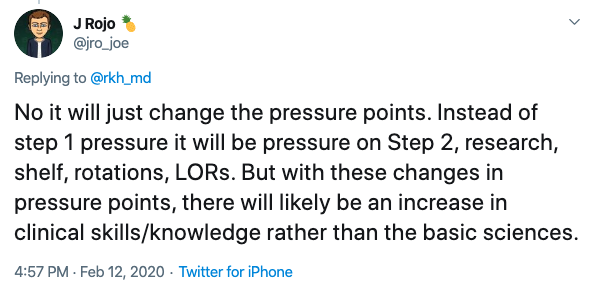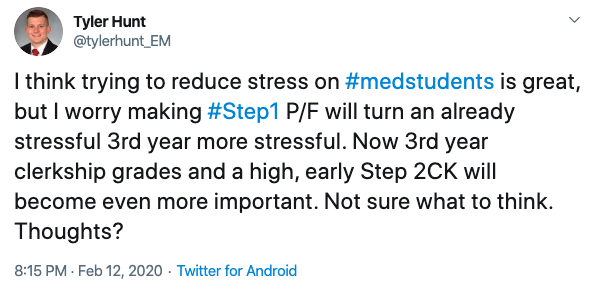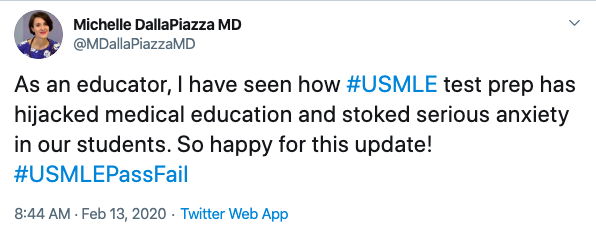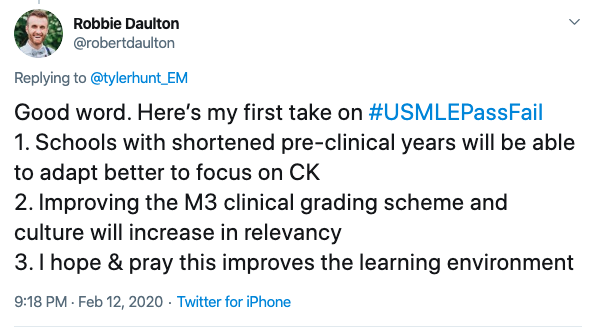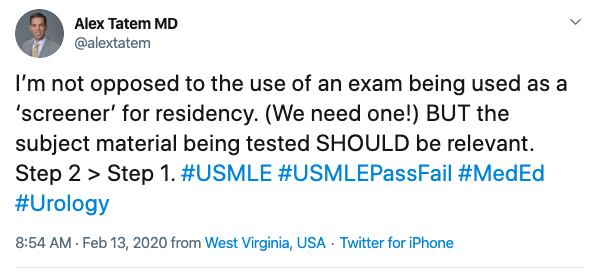Everything You Need to Know About The USMLE Step 1 Pass Fail Update
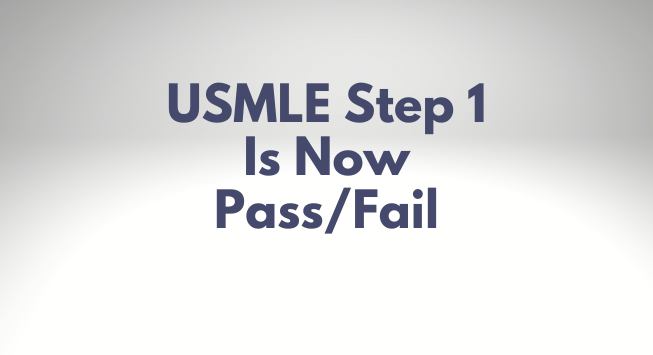
The United States Medical Licensing Exam (USMLE) has officially changed the Step 1 exam to Pass Fail as of today, January 26th, 2022!
"USMLE Step 1 score reporting will transition from a numeric score and pass/fail outcome to pass/fail only for exams taken on or after January 26, 2022." USMLE.org
Here's everything you need to know about how the USMLE Step 1 exam is now scored:
What Are the USMLE Exams?
The USMLE exams are a 3-exam series of assessments that provide state medical boards with info regarding a medical licensure applicant’s knowledge and skills to practice medicine.
For med students, the USMLE exams are mostly known as the assessment tool residency programs use to screen residency applicants. And they are immensely important to med students for that reason—the higher your USMLE score report (now numeric scores are only reported for Step 2), the higher likelihood of being accepted into the residency program of your choice.
Why Is It Changing?
In recent years, the USMLE Step 1 scores were numerical scores for this exam, used in ways that the exam wasn't created for—like assessing a med student’s academic achievements during the residency application process.
Since their conception, the USMLE has positioned the exams as designed to report to state medical boards that a med school graduate has the skills and knowledge to practice medicine. Any use other than this (including using the USMLE score report in the residency application/selection process) is a secondary use, and not what the exam was designed for.
In March of 2019, the USMLE hosted a conference called InCUS: Invitational Conference on USMLE Scoring, where they invited 5 organizations [The Association of American Medical Colleges (AAMC), American Medical Association (AMA), the Educational Commission for Foreign Medical Graduates (ECFMG), the Federation of State Medical Boards (FSMB) and the National Board of Medical Examiners (NBME)] to gather to discuss the USMLE exams. They wanted to collaboratively review the numeric USMLE score report within the context of licensure, as well as secondary uses and broader topics.
There's a big impact on medical schools and medical students, in regards to USMLE exams, according to the InCUS summary:
- Students are preparing for these high-stakes exams, negatively impacting their mental health/well-being
- Students feel like what they're learning in med school doesn't match what's on the USMLE exam
- There's a trend towards introducing clinical earlier in med school education, but schools see their students focusing their energy on doing well on their Step 1 exam & basic sciences, and it limits their ability to make meaningful curriculum changes
- If competency isn't on a USMLE exam, students are essentially ignoring it (or, at least, de-emphasizing it)
This group of stakeholders explored 10 potential paths forward, including the shift of all or part of USMLE to pass fail. There was a general consensus among the participants, which led them to recommendations that included making the Step 1 exam pass fail in order to reduce the overemphasis on USMLE performance in residency screening and selection.
What’s The Benefit of Making USMLE Step 1 Pass Fail?
- Medical schools will be better equipped to introduce clinical early on in their curriculum
- The USMLE program can provide high-quality assessments for the primary use of the exam results (state medical boards)
- Reduces overemphasis on USMLE exam performance and improves medical student well-being
Okay… But Won’t These Changes Just Place More Emphasis on the Step 2 Exam?
That’s the major feedback we’re seeing from those who are impacted (med students) by the Step 1 pass fail. And there has been a growing trend in residency program directors looking at USMLE Step 2 scores to screen applicants.
Participants at the InCUS conference talked through 3 options (not just the pass fail option!) to change the USMLE’s current reporting practices: Pass Fail of Step 1 alone or the entire USMLE sequence, tiered scoring, or a composite score of both assessments (Step 1, Step 2). Ultimately, they decided to make USMLE Step 1 pass fail, get rid of the Step 2 CS exam, and keep using numerical scoring for the Step 2 CK exam. Students are required a USMLE Step 2 score of at least 209 in order to pass.
Because of this change, students and residency programs are now focusing more on the Step 2 exam score. This seems like it would just shift the stress from Step 1 to Step 2, but it actually reduces opportunities for students to rate their performance numerically—which will surely decrease rates of depression among medical students. Getting students into that mindset even earlier in their education is also shown to increase resiliency.
Potential Impact of Making the USMLE Step 1 Pass Fail
There’s still a ton of unknowns for medical students. How will these changes impact DO students? International students? How will students stand out during the residency application process?
And there are some potential benefits, too. The Step 1 Exam is widely known as the assessment that’ll make or break the career medical students have been working at for years—making it pass fail will potentially decrease the level of stress for students, and maybe even allow them to focus on other facets of their medical education.
Standardized tests historically bias against those who lack resources to adequately prepare. Moving to a pass fail scoring will open doors for minorities and increase diversity in residency programs.
This topic came up again and again at the conference. Participants reached a consensus that included that the UME-GME transition system has negatively impacted diversity. Among their goals for the USMLE program was to “minimize racial demographic differences in USMLE performance.”
The USMLE program is working to find solutions for this lack of diversity, including additional collaborative and grant-funded research, and working with medical schools to develop model USMLE prep programs.
For residency program directors, we can only hope that they’ll lean less into exam scores in the residency application process and look at other areas that students excel in—but it’s unlikely that there will be major changes in their process, especially with the Step 2 and Step 3 still being given a numerical score. It's likely that PD's will place even more importance on an applicant's USMLE Step 2 score.
Other Changes in the USMLE Score Report
Along with making the USMLE Step 1 pass fail, the USMLE also announced that they would be reducing the number of allowable attempts on each Step Exam from 6 to 4 attempts.
Is Step 1 Pass Fail Now?
Yes, as of January 26th, 2022 the USMLE Step 1 is Pass Fail.
Always stay in the know about medical school news by following us on Instagram.
Looking for an integrated way to study for Step 1 and Step 2? Check out our Medical Student Study Strong System.


